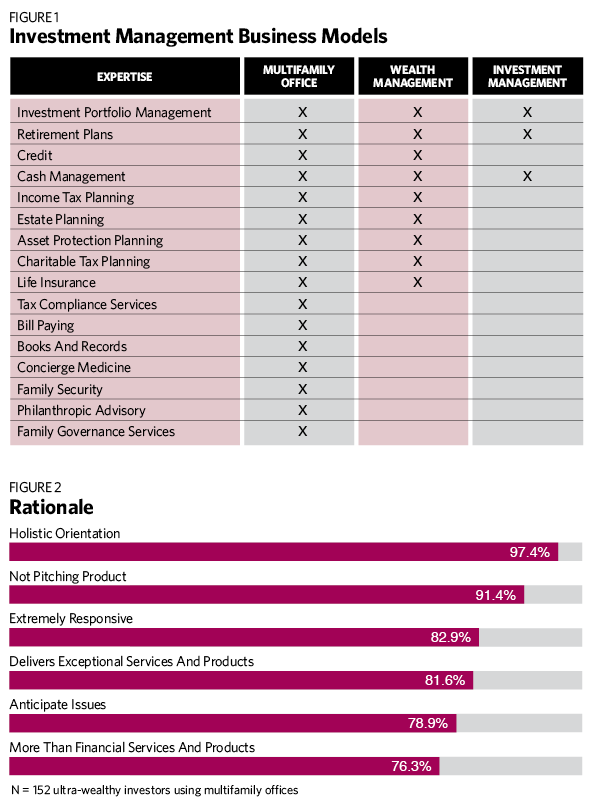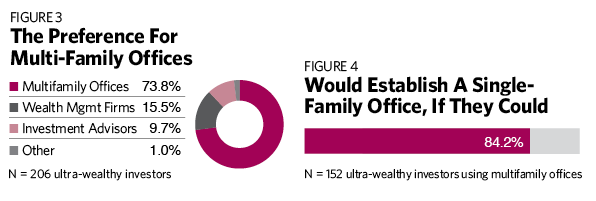
Many different types of firms are competing to help the ultra-wealthy (those with $10 million or more in assets) with their financial needs. Certainly money managers are. But given the fierce competition, it’s not just investment performance that counts—it’s also the business model.
There are basically three types: investment managers, wealth managers and multifamily officers.
Each has advantages and disadvantages. All should be able to provide investment portfolio management, including asset allocation, rebalancing and a diverse set of potential investments.
But the multifamily office and wealth management models add various wealth planning specialties and life insurance. The wealth management business model includes a range of wealth planning services and life insurance. The multifamily office takes that further and incorporates a broad array of administrative and lifestyle services.
One model is not inherently superior to another for portfolio management expertise, but the ultra-wealthy do have preferences.


The Multifamily Office Advantage
According to a survey of 206 ultra-wealthy investors, about three-quarters prefer to work with multifamily offices (Figure 3). Another 15% gravitate to firms with wealth management models. Less than 10% choose investment advisors. The remaining few choose other types of firms (such as planning firms where money management is secondary).
The near universal appeal of the multifamily office model is its holistic orientation. A well-run multifamily office delivers the best solutions (not services or products). To the point: Nine out of 10 ultra-wealthy investors say they like the fact that the multifamily office is not pitching products.
More than eight out of 10 of those surveyed see multifamily offices as being extremely responsive to their needs as well. Again, a distinguishing characteristic of these offices is that they are exceedingly service-oriented; they not only quickly address issues but they can also anticipate issues and keep solutions at hand.
About four out of five ultra-wealthy investors are looking for state-of-the-art solutions and see multifamily offices as the best provider of exceptional services and products.
The Multifamily Office Model
In principal, just about any financial advisor can create and manage a multifamily office practice. The majority of multifamily offices, like single-family offices, outsource services and products that are not their core expertise to other professionals and providers.
In building a multifamily office practice, it’s important for financial advisors to have a firm grasp of what they and their firms do well and what expertise needs to be gleaned from outside their companies. The list of wants is overlaid on what the ultra-wealthy want, and the gaps are filled by external experts.
To construct a high-caliber multifamily office practice, financial advisors usually have to be able to do the following things:
Capably profile the ultra-wealthy: Being able to develop a comprehensive understanding of ultra-wealthy investors is a necessity. They need more than the perspectives required for portfolio management.
Build alliances with diverse resources and manage these relationships: Think of a multifamily office as a synergistic collection of specialized services, some of them that financial advisors may outsource.
The relationships with outside specialists are best if they are very well structured and established way ahead of when their expertise is needed. Advisors also need to ensure that the various specialists are able to work effectively as a team.
Manage the relationships with the ultra-wealthy client: There are no handoffs in the multifamily office model. Whether the experts are in-house or external and part of a professional support system, the financial advisor is responsible for the delivery of all the expertise and for ensuring the ultra-wealthy investor’s experience is as good as possible.
It’s valuable to make the experience with the different specialists as seamless as can be. This can only be accomplished when the financial advisor is directing all the various professionals and other providers—because he or she has the best understanding of the ultra-wealthy investor.
Russ Alan Prince is president of R.A. Prince & Associates.
Brett Van Bortel is director of consulting services for Invesco Consulting.